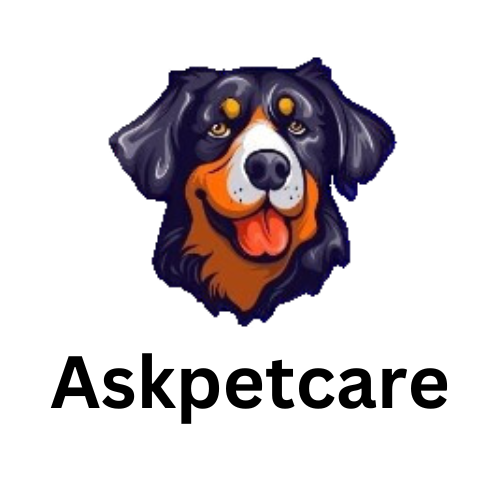Hello dog lovers, today Allergic Conjunctivitis in GSD is my topic. Here I will explain in detail what is allergic conjunctivitis, its major signs and causes, and at the end its treatment in detail.
Firstly understand what Allergic Conjunctivitis in GSD is: step by step.
Allergic conjunctivitis is a condition that affects a dog’s eyes. The conjunctiva is a thin layer of tissue that covers the white part of the eye and the inner surface of the eyelids. When a dog has allergic conjunctivitis, it means that this tissue becomes inflamed and irritated due to an allergic reaction.

Hello everyone who loves dogs! I’m Dr. Arif Aziz, and I’ve been taking care of pets especially dogs at my clinic for a long time, exactly 14 years! I’m here to share some valuable information with you that I’ve gathered from books during my study time written by experts in veterinary medicine (DVM) and MSC (Master of Science), as well as from my own experiences working with dogs.
Let’s delve deeper into allergic conjunctivitis with a focus on the structure of the eye:
Introduction to Eye Structure:
Before we dive into Allergic Conjunctivitis, let’s understand a bit about how a dog’s eye is built. The eye is a remarkable organ responsible for vision. It’s like a tiny camera, capturing images and sending them to the brain for interpretation.
Layers of the Eye:
The eye has several layers, and one of these layers is called the conjunctiva. Picture it like a thin, clear film covering the white part of the eye (the sclera) and the inner surface of the eyelids. This conjunctiva acts as a protective barrier, shielding the eye from dust, debris, and harmful microorganisms.

Understanding Allergic Conjunctivitis:
Now, when a dog experiences allergic conjunctivitis, it means this protective layer, the conjunctiva, is reacting. Allergens in the environment, such as pollen, dust, mold, or certain food ingredients, can trigger this reaction. When these allergens come into contact with the conjunctiva, the immune system kicks in, thinking it’s under attack. This causes inflammation and irritation of the conjunctiva, leading to the symptoms we observe.
Today, we’re going to talk about something that might sound a bit fancy but is quite common among our furry friends, especially German Shepherds. It’s called allergic conjunctivitis. Now, what exactly is that? Well, imagine your dog’s eyes feeling itchy, watery, and irritated, kind of like when we humans get allergies. That’s what allergic conjunctivitis is – it’s when your dog’s eyes get all red and uncomfortable because of certain allergens in their environment.
Now, why is this important? As pet parents, understanding allergic conjunctivitis is crucial because it can bother our pups and affect their quality of life. Plus, knowing about it helps us take the right steps to help our furry pals feel better.
Now understand the Causes of Allergic Conjunctivitis in GSD:
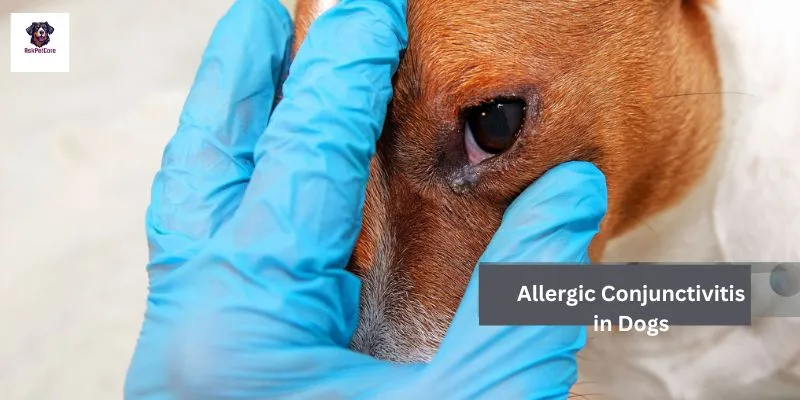
Now I will tell you some common allergens that can trigger allergic conjunctivitis in German Shepherds and how they contribute to the condition:
- Pollen:
- Pollen from trees, grasses, and flowers is a common environmental allergen that can trigger allergic conjunctivitis in German Shepherds, especially during spring and summer when pollen counts are high.
- Dust Mites:
- Dust mites are microscopic insects found in household dust. Their feces contain proteins that can trigger allergic reactions in sensitive dogs, leading to conjunctival inflammation.
- Mold Spores:
- Mold spores thrive in damp environments, such as basements, bathrooms, and outdoor areas with decaying vegetation. When inhaled or come into contact with the eyes, mold spores can cause allergic reactions, including conjunctivitis.
- Certain Foods:
- Some German Shepherds may be allergic to specific food ingredients, such as certain proteins (e.g., beef, chicken, or grains like wheat), preservatives, or artificial additives. When ingested, these allergens can lead to systemic allergic reactions that may include eye inflammation.
- Chemical Irritants:
- Chemicals found in household cleaning products, perfumes, air fresheners, and pesticides can irritate a dog’s eyes and trigger allergic conjunctivitis. Dogs with sensitive skin or mucous membranes may be particularly susceptible.
- Flea Saliva:
- Flea saliva contains proteins that can cause allergic reactions in dogs, including itching, redness, and swelling of the skin and mucous membranes, including the eyes.
- Grass and Weed Pollens:
- Besides tree pollen, grass, and weed pollens can also be significant allergens for German Shepherds. These allergens are prevalent in outdoor environments and can trigger allergic reactions when dogs come into contact with them.
- Perfumes and Fragrances:
- Perfumes, colognes, and scented grooming products can contain chemicals and fragrances that may irritate a dog’s eyes and exacerbate allergic conjunctivitis symptoms.
- Tobacco Smoke:
- Tobacco smoke contains numerous chemicals and irritants that can affect the respiratory system and mucous membranes, including the eyes. Exposure to tobacco smoke can exacerbate allergic reactions in dogs, including conjunctivitis.
- Seasonal Changes:
- Seasonal changes, such as temperature fluctuations and humidity levels, can influence the distribution of allergens in the environment. German Shepherds may experience flare-ups of allergic conjunctivitis during specific seasons due to increased exposure to allergens like pollen and mold spores.
- my related article.
- allergic-otitis-in-dogs.
Understanding these common allergens and environmental factors can help pet owners take proactive measures to minimize their German Shepherd’s exposure and manage allergic conjunctivitis effectively. If symptoms persist or worsen, consulting with a veterinarian is essential for proper diagnosis and treatment.

Now Understand Symptoms Of Allergic Conjunctivitis In GSD:
Now discuss some typical symptoms of allergic conjunctivitis in German Shepherds and why it’s crucial to recognize them early for prompt treatment:
- Redness:
- One of the most noticeable signs of allergic conjunctivitis is redness of the conjunctiva, which can make the whites of the eyes appear pink or even bloodshot. This redness is caused by inflammation triggered by the allergic reaction.
- Itching:
- German Shepherds with allergic conjunctivitis often experience intense itching in and around the eyes. You may notice them rubbing their eyes against objects or pawing at their face in an attempt to relieve the itching sensation.
- Swelling:
- Swelling of the eyelids and surrounding tissues is another common symptom of allergic conjunctivitis. The inflammation caused by the allergic reaction can lead to puffiness and swelling, making the eyes appear swollen or droopy.
- Excessive Tearing:
- Excessive tearing, also known as epiphora, is a hallmark symptom of allergic conjunctivitis. The eyes may produce more tears than usual in response to the irritation, resulting in watery discharge that can stain the fur around the eyes.
- Discharge:
- In addition to excessive tearing, dogs with allergic conjunctivitis may also experience discharge from the eyes. This discharge can vary in consistency from clear and watery to thick and mucousy, depending on the severity of the inflammation.
- Squinting:
- Squinting or blinking excessively is a sign that your German Shepherd’s eyes are uncomfortable. Squinting helps reduce exposure to irritants and protect the eyes from further irritation caused by bright light or foreign particles.
- Sensitivity to Light:
- Dogs with allergic conjunctivitis may exhibit sensitivity to light, known as photophobia. They may avoid bright sunlight or squint when exposed to light sources, as bright light can exacerbate their eye discomfort.
- Pawing at the Eyes:
- Another common symptom of allergic conjunctivitis is pawing at the eyes. Your German Shepherd may use their paws to rub or scratch at their eyes in an attempt to alleviate itching or discomfort.
- Changes in Behavior:
- Dogs experiencing discomfort from allergic conjunctivitis may exhibit changes in behavior, such as decreased activity levels, reluctance to play, or seeking isolation. They may also display signs of irritability or agitation.
- Eye Discomfort during Certain Activities:
- You may notice your German Shepherd showing signs of eye discomfort during specific activities, such as after spending time outdoors, playing in grassy areas, or being exposed to potential allergens like dust or pollen.
Recognizing these symptoms early is essential for prompt treatment and relief of your German Shepherd’s discomfort. If you notice any of these signs, it’s essential to consult with a veterinarian for a proper diagnosis and tailored treatment plan to address your dog’s allergic conjunctivitis effectively. Early intervention can help prevent the condition from worsening and improve your dog’s overall quality of life.
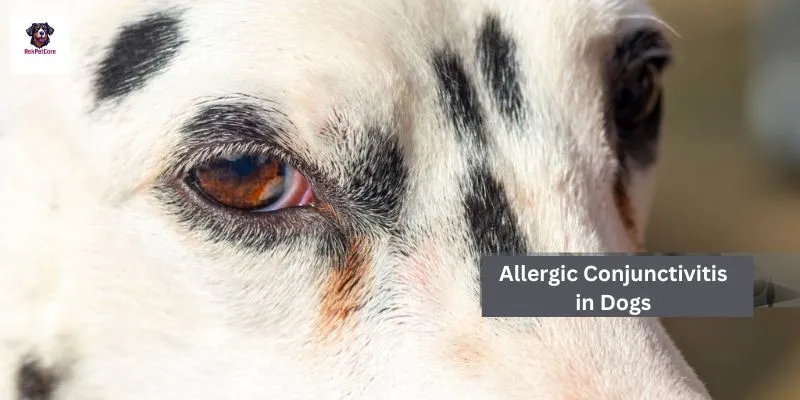
Now discuss how to diagnose Allergic Conjunctivitis in GSD:
Now understand how veterinarians diagnose allergic conjunctivitis in dogs and the importance of ruling out other potential causes of eye irritation:
- Physical Examination:
- During a physical examination, the veterinarian will carefully inspect your dog’s eyes for signs of inflammation, redness, swelling, discharge, and any abnormalities. They may use a specialized instrument called an ophthalmoscope to examine the internal structures of the eye, including the retina and optic nerve.
- Medical History Review:
- Gathering a comprehensive medical history is crucial in diagnosing allergic conjunctivitis. The veterinarian will ask about your dog’s recent exposure to potential allergens, any previous episodes of eye irritation or allergies, changes in diet or environment, and any concurrent medical conditions or medications.
- Symptom Assessment:
- The veterinarian will assess the specific symptoms your dog is experiencing, such as itching, excessive tearing, discharge, and sensitivity to light. The presence of these symptoms, along with the physical examination findings, can help support a diagnosis of allergic conjunctivitis.
- Allergy Testing:
- In some cases, allergy testing may be recommended to identify specific allergens triggering your dog’s allergic conjunctivitis. This can involve skin prick tests or blood tests to detect allergic reactions to common environmental allergens, foods, or other substances.
-
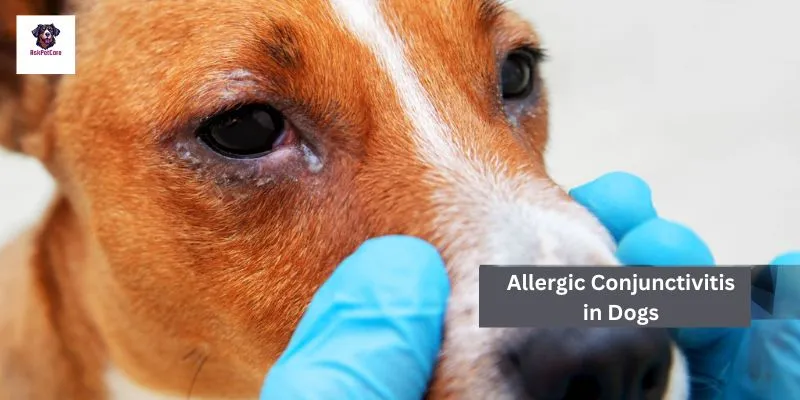
Allergic Conjunctivitis in GSD
- Conjunctival Cytology:
- Conjunctival cytology involves collecting a sample of cells from the conjunctiva for microscopic examination. This test can help identify inflammatory cells and assess the severity of inflammation present in the conjunctiva, supporting a diagnosis of allergic conjunctivitis.
- Schirmer Tear Test:
- The Schirmer tear test measures the production of tears by the eyes. It can help assess tear production and evaluate for conditions such as dry eye (keratoconjunctivitis sicca), which can mimic some symptoms of allergic conjunctivitis.
- Fluorescein Staining:
- Fluorescein staining involves applying a special dye to the surface of the eye to detect corneal ulcers or abrasions. While not specific to allergic conjunctivitis, this test helps rule out other potential causes of eye irritation and discomfort.
- Intraocular Pressure Measurement:
- Measuring intraocular pressure can help assess for conditions such as glaucoma, which can cause eye redness, pain, and vision changes. Although less common, glaucoma can sometimes coexist with allergic conjunctivitis, so ruling it out is important.
- Microbial Culture and Sensitivity Testing:
- If there is suspicion of bacterial or fungal infection contributing to the eye irritation, the veterinarian may perform microbial culture and sensitivity testing on eye discharge samples to identify the causative organism and determine the most effective treatment.
- Response to Treatment:
- Finally, the veterinarian may consider your dog’s response to treatment as part of the diagnostic process. If symptoms improve with appropriate therapy for allergic conjunctivitis, it further supports the diagnosis.
Ruling out other potential causes of eye irritation is crucial in ensuring an accurate diagnosis and appropriate treatment for your dog’s condition. By employing a combination of diagnostic techniques and careful assessment, veterinarians can effectively diagnose allergic conjunctivitis and provide targeted management strategies to help relieve your dog’s discomfort.
Now understand how to treat Allergic Conjunctivitis in GSD:
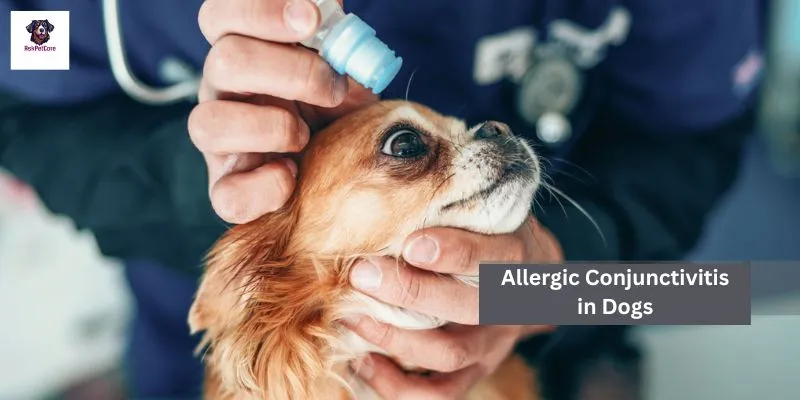
Let’s plan various treatment options for managing allergic conjunctivitis in German Shepherds:
- Medical Treatments:
- Antihistamines: Oral or topical antihistamines may be prescribed to help reduce allergic reactions and relieve itching associated with allergic conjunctivitis.
Antihistamines:
- Diphenhydramine (Benadryl): Diphenhydramine is a widely used antihistamine available in both oral and topical formulations. It helps alleviate itching and allergic reactions associated with allergic conjunctivitis.
- Cetirizine (Zyrtec): Cetirizine is another oral antihistamine commonly used to relieve allergy symptoms in dogs, including itching and discomfort related to allergic conjunctivitis.
- Chlorpheniramine (Chlor-Trimeton): Chlorpheniramine is an older-generation antihistamine that can be effective in managing allergy symptoms, including those affecting the eyes.
- Loratadine (Claritin): Loratadine is a non-drowsy antihistamine that may be prescribed to dogs with allergic conjunctivitis to help reduce itching and inflammation.
- Fexofenadine (Allegra): Fexofenadine is another non-drowsy antihistamine that may be used to alleviate allergy symptoms, including those affecting the eyes, in dogs.
Eye Drops:
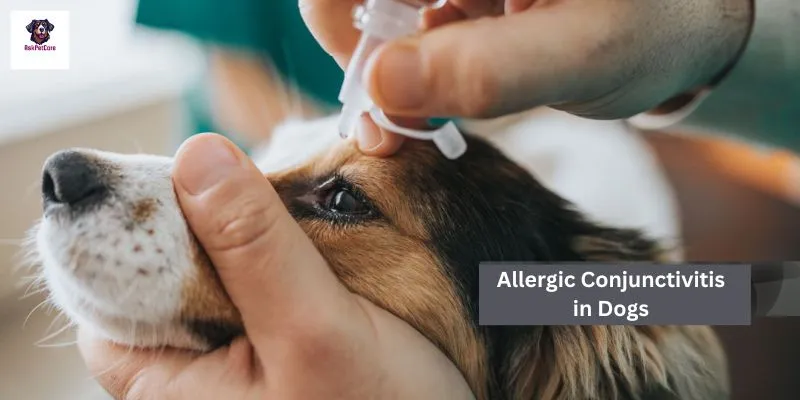
- Medicated eye drops containing anti-inflammatory agents or soothing ingredients can help alleviate redness, swelling, and discomfort in the eyes.
- Neomycin-Polymyxin B-Dexamethasone (Maxitrol): Maxitrol is a combination eye drop containing neomycin, polymyxin B, and dexamethasone. It is often prescribed to manage inflammation and bacterial infections of the eye, including allergic conjunctivitis.
- Ketotifen (Zaditor): Ketotifen is an over-the-counter eye drop that contains an antihistamine and mast cell stabilizer. It can help relieve itching and redness associated with allergic conjunctivitis.
- Olopatadine (Patanol, Pataday): Olopatadine is a prescription eye drop that works as an antihistamine and mast cell stabilizer. It is used to relieve itching and discomfort caused by allergic conjunctivitis.
- Loteprednol Etabonate (Alrex): Alrex is a corticosteroid eye drop that is commonly prescribed for the short-term management of inflammation and allergic reactions in the eyes, including allergic conjunctivitis.
- Cromolyn Sodium (Opticrom, Crolom): Cromolyn sodium is an eye drop medication that works as a mast cell stabilizer, helping to prevent the release of histamine and other inflammatory mediators. It is used to relieve itching and discomfort associated with allergic conjunctivitis.
It’s important to note that the use of these medications should always be under the guidance of a veterinarian, as dosages and administration methods may vary based on the individual dog’s needs and medical history.
Steroids: In severe cases or during flare-ups, corticosteroid eye drops or ointments may be prescribed to quickly reduce inflammation and alleviate symptoms.
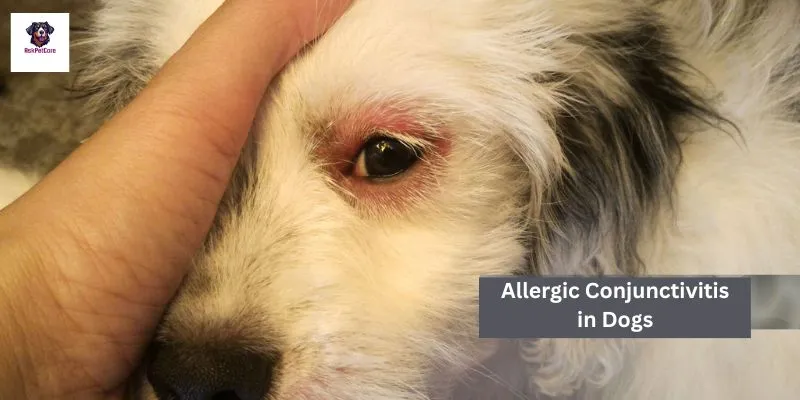
- Environmental Management:
- Allergen Avoidance: Identifying and minimizing exposure to known allergens, such as pollen, dust, and mold, can help prevent allergic conjunctivitis flare-ups. This may involve keeping indoor environments clean, using air purifiers, and avoiding outdoor activities during high pollen seasons.
- Dietary Modifications: Some dogs may benefit from dietary modifications, such as switching to hypoallergenic or limited ingredient diets, to help manage food allergies that contribute to allergic conjunctivitis.
- Eye Care Practices:
- Regular Eye Cleaning: Gentle cleaning of the eyes with a damp cloth or saline solution can help remove allergens and discharge, reducing irritation and preventing secondary infections.
- Warm Compresses: Applying warm compresses to the eyes can help soothe inflammation and promote tear production, providing relief from dryness and discomfort.
- Moisturizing Agents:
- Artificial Tears: Lubricating eye drops or ointments, also known as artificial tears, can help moisturize the eyes and improve tear film stability, reducing dryness and irritation.
- Hyaluronic Acid: Eye drops containing hyaluronic acid can help hydrate and protect the ocular surface, supporting overall eye health and comfort.
- Nutritional Supplements:
- Omega-3 Fatty Acids: Supplementing your dog’s diet with omega-3 fatty acids can help reduce inflammation and support ocular health, potentially decreasing the severity of allergic conjunctivitis symptoms.
- Immunotherapy:
- Allergy Shots: In cases of severe or recurrent allergic conjunctivitis, allergen-specific immunotherapy may be recommended. This involves administering gradually increasing doses of allergens to desensitize the immune system and reduce allergic reactions over time.
- Environmental Modifications:
- Dust and Pollen Control: Implementing measures to reduce indoor dust and pollen exposure, such as using allergen-proof bedding covers and regularly vacuuming and dusting, can help minimize allergen triggers for allergic conjunctivitis.
- Protective Eyewear:
- Eye Protection: In environments with high levels of dust, pollen, or other irritants, protective eyewear such as doggy goggles or visors can help shield your German Shepherd’s eyes and prevent allergen exposure.
- Stress Reduction:
- Stress Management: Minimizing stress and anxiety in your dog through regular exercise, mental stimulation, and positive reinforcement training can help support overall immune function and reduce susceptibility to allergic reactions.
- Regular Veterinary Monitoring:
- Follow-up Visits: Regular check-ups with your veterinarian are essential for monitoring your dog’s response to treatment, adjusting medications as needed, and addressing any new or worsening symptoms promptly.
Remember, each dog is unique, and what works for one may not work for another. Consulting with a veterinarian is crucial for developing a tailored treatment plan that addresses your German Shepherd’s specific needs and ensures optimal management of allergic conjunctivitis.
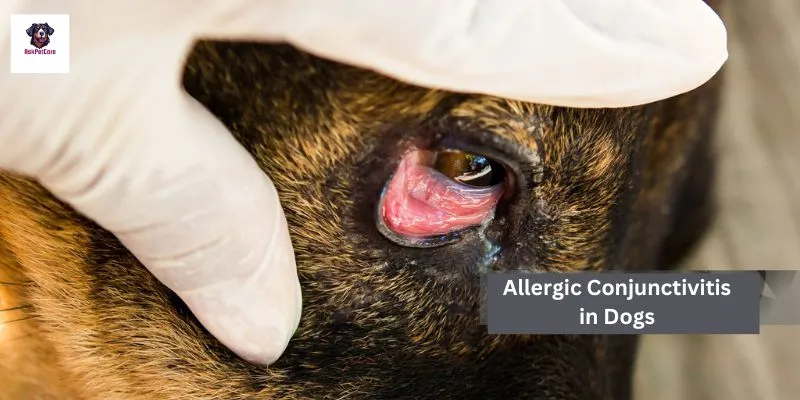
Now understand preventions of Allergic Conjunctivitis in GSD:
Here are some tips for preventing allergic conjunctivitis flare-ups in German shepherd dogs.
- Minimize Exposure to Allergens:
- Limit your dog’s exposure to common allergens such as pollen, dust, and mold by keeping them indoors during peak pollen seasons, using air purifiers, and avoiding areas with high concentrations of allergens.
- Regular Grooming:
- Regular grooming practices, including brushing your dog’s coat and wiping their paws after outdoor activities, can help reduce the amount of allergens they bring into the home, minimizing the risk of allergic reactions.
- Clean Living Environment:
- Keep your home clean and free of dust, mold, and other potential allergens by vacuuming regularly, washing bedding frequently, and using allergen-proof covers on pillows and mattresses.
- Air Quality Control:
- Use air purifiers or filters to help remove allergens from the indoor air, creating a cleaner and healthier environment for your German Shepherd.
- Dietary Modifications:
- Consider dietary modifications, such as switching to hypoallergenic or limited ingredient diets, to help manage food allergies that may contribute to allergic conjunctivitis.
- Bathing and Eye Cleaning:
- Bathe your dog regularly using a gentle, hypoallergenic shampoo to remove allergens from their skin and coat. Additionally, gently clean around their eyes with a damp cloth to remove any debris or discharge that could irritate the eyes.
- Avoid Irritants:
- Minimize your dog’s exposure to potential eye irritants such as cigarette smoke, strong perfumes, and harsh cleaning chemicals, as these can exacerbate allergic conjunctivitis symptoms.
- Regular Exercise and Mental Stimulation:
- Provide regular exercise and mental stimulation for your German Shepherd to help strengthen their immune system and reduce stress, which can help prevent allergic reactions.
- Allergen Testing:
- Consider allergy testing for your dog to identify specific allergens that trigger their allergic reactions. This information can help you take targeted measures to reduce exposure and minimize flare-ups.
- Veterinary Check-Ups:
- Schedule regular veterinary check-ups for your German Shepherd to monitor their overall health and eye condition. Your veterinarian can guide preventive measures and recommend appropriate treatment if allergic conjunctivitis symptoms occur.
By implementing these preventive measures and working closely with your veterinarian, you can help minimize the frequency and severity of allergic conjunctivitis outbreaks in your German Shepherd dog.
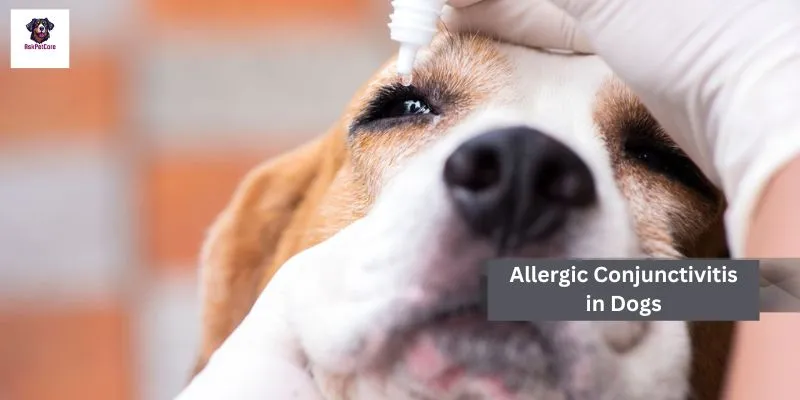
Lifestyle Management:
Now we understand how lifestyle management reduces Allergic Conjunctivitis in GSD:
Here’s some practical advice for managing allergic conjunctivitis in German shepherd dogs on a day-to-day basis:
- Regular Eye Cleaning:
- Make eye cleaning a part of your dog’s regular grooming routine. Use a soft, damp cloth or sterile saline solution to gently wipe away any discharge or debris from around the eyes. This helps reduce irritation and prevents buildup of allergens that can exacerbate allergic conjunctivitis.
- Minimize Allergen Exposure:
- Take steps to minimize your dog’s exposure to common allergens such as pollen, dust, and mold. Keep them indoors during peak pollen seasons, use air purifiers to filter indoor air, and avoid walking in areas with high concentrations of allergens.
- Maintain a Healthy Diet:
- Feed your dog a balanced and nutritious diet that supports their overall health and immune function. Consider consulting with your veterinarian to determine if dietary modifications, such as incorporating omega-3 fatty acids or hypoallergenic food options, may be beneficial for managing allergic conjunctivitis.
- Manage Environmental Factors:
- Keep your home clean and free of potential allergens by vacuuming regularly, washing bedding frequently, and using hypoallergenic cleaning products. Minimize exposure to smoke, strong odors, and other irritants that can exacerbate allergic reactions.
- Regular Exercise and Mental Stimulation:
- Provide your German Shepherd with regular exercise and mental stimulation to support their overall well-being and immune function. Physical activity helps maintain a healthy weight and reduces stress, which can contribute to immune system health and resilience to allergens.
- Monitor Symptoms:
- Keep an eye out for any changes in your dog’s eye health, such as redness, swelling, excessive tearing, or discharge. Monitor their behavior for signs of discomfort or itching around the eyes. Promptly address any symptoms by consulting with your veterinarian for appropriate treatment.
- Preventative Eye Care:
- Consider using preventative eye care products recommended by your veterinarian, such as lubricating eye drops or wipes designed for sensitive eyes. These products can help maintain eye health and reduce the risk of allergic conjunctivitis flare-ups.
- Regular Veterinary Check-Ups:
- Schedule regular check-ups with your veterinarian to monitor your dog’s overall health and eye condition. Your veterinarian can guide managing allergic conjunctivitis and recommend appropriate treatments or adjustments to your dog’s care routine as needed.
By incorporating these practical strategies into your daily routine and working closely with your veterinarian, you can effectively manage allergic conjunctivitis in your German Shepherd dog and help them enjoy a happy, healthy life.
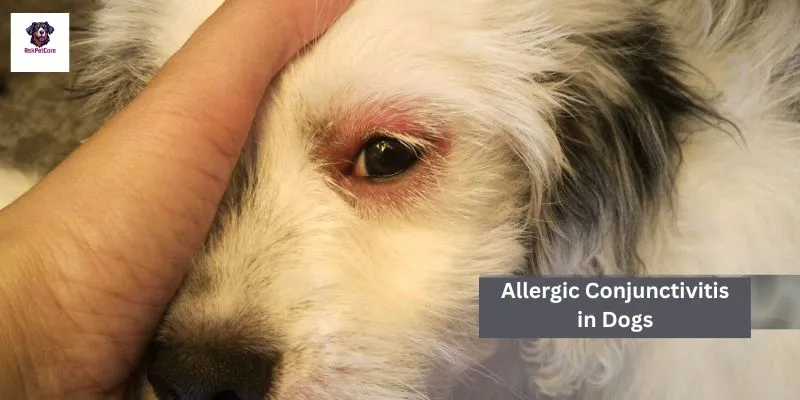
Conclusion:
Allergic conjunctivitis is a manageable condition that can significantly impact a dog’s comfort and quality of life. By implementing preventive measures, such as minimizing allergen exposure, maintaining a healthy lifestyle, and seeking veterinary care when needed, pet owners can help alleviate symptoms and ensure their furry companions enjoy optimal eye health. Always consult with a veterinarian for personalized advice and treatment options tailored to your dog’s specific needs.
I hope you will thoroughly understand about Allergic Conjunctivitis in GSD If you have any queries contact me.
- Question: What are the common causes of allergic conjunctivitis in dogs?
Answer: Common causes include pollen, dust mites, mold spores, certain foods, and chemical irritants.
- Question: How do I know if my dog has allergic conjunctivitis?
Answer: Look for symptoms such as redness, itching, swelling, excessive tearing, and discharge from the eyes.
- Question: Can I give my dog human antihistamines for allergic conjunctivitis?
Answer: It’s best to consult with a veterinarian before giving your dog any medications, including antihistamines, as dosage and safety can vary.
- Question: What are some home remedies for allergic conjunctivitis in dogs?
Answer: Home remedies may include regular eye cleaning, minimizing allergen exposure, and providing a healthy diet and lifestyle.
- Question: When should I take my dog to the vet for allergic conjunctivitis?
Answer: It’s important to seek veterinary care if your dog’s symptoms are severe, persistent, or worsening, or if you notice any changes in their behavior or overall health.
Here are some reference books that are considered authoritative on the topic:
These books cover a range of topics related to dermatology and skin diseases in dogs, including diagnosis, treatment, and management of skin conditions.
- “Muller and Kirk’s Small Animal Dermatology” by William H. Miller Jr. DVM DACVD, Craig E. Griffin DVM DACVD, Karen L. Campbell DVM DACVD :
- “Skin Diseases of the Dog and Cat” by Nicole A. Heinrich DVM DACVD, Melissa Eisenschenk DVM DACVD – :
- “Canine and Feline Dermatology Drug Handbook” by Sandra N. Koch DVM MS DACVD, Cheryl S. Hedlund DVM MS DACVD :
Disclaimer: This information is general advice only. Before starting any treatment or supplement with your pet, please consult your vet first for the best approach to getting your pet back to its best health.
Check with your veterinarian before giving any medication or supplement at home, to be sure it’s safe for your pup. Some substances can be toxic or harmful, including “dog-safe” medications and supplements if they are given at the wrong dosage.
